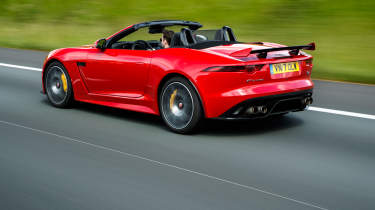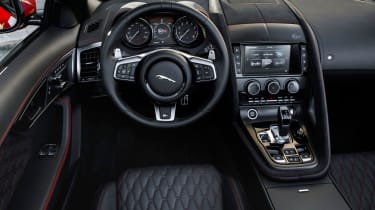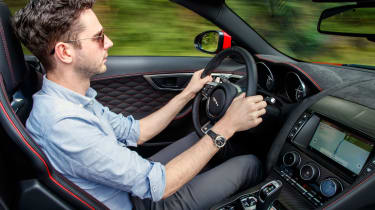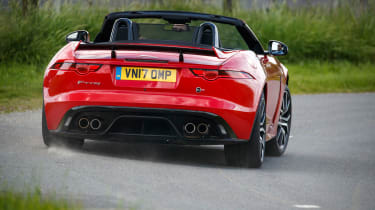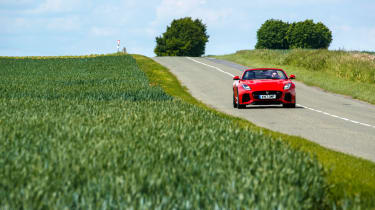2017 Jaguar F-type SVR review – small tweaks to the top-of-the-range F-type
Phenomenal firepower of the 5-litre V8 is matched by impressive traction, but the SVR still lacks subtlety
The Jaguar F-Type SVR is all about small incremental improvements to many components to make the British coupe faster and more aggressive, but without losing any of its usability.
To help achieve these goals the SVR has 25bhp and 15lb ft of torque more than the V8 F-type R, and it retains the R’s four-wheel drive to aid traction – especially in iffy or wet conditions.
Jaguar hasn’t dramatically changed the SVR’s chassis. Instead it has improved the durability of some of the suspension components to further improve grip, while other components have been altered to change the car’s balance and improve agility.
> Read about SVO's latest creation: the Jaguar XE SV Project 8
The SVR’s exterior changes are as blatant as the chassis alterations are subtle. There are vast air intakes in the bumper, gills down the side of the car, blocky sills and, most obvious, a carbonfibre rear wing.
But none of that is new, it’s just the way the SVR has always been. What the 2018 model year car gets is a new infotainment system and some racy slim seats. Of all of the variants in the F-type range, the SVR is the one that’s received the fewest tweaks. However, we suspect there are more changes that Jaguar has led us to believe.
Technical highlights
In a bid to save weight, Jaguar has opted to use some very expensive, high-tech materials in the SVR’s exhaust. The system made up from both titanium and Inconel and saves 16kg over the F-type R’s exhaust.
More reviews
Inconel is a nickel and chrome alloy that’s not only strong but is resistant to corrosion throughout a large temperature range. Once heated it forms an oxide layer on its outer surface that helps protect it from corrosion.
Inside, the new infotainment system is quick and easy to use. The long delays that Jaguar’s old system used to make you wait through before the screen reacted are gone. The graphics are simplistic, so it doesn’t look all that modern but it makes the screen is easy to read, essential when driving. The UI is also intuitive to use thanks to pinch to zoom gestures and big clear buttons.
Engine, transmission and 0-60 time
There haven’t been any changes to the F-type SVR’s engine from the previous model, it still uses the same supercharged 5-litre V8. But that’s hardly an issue, with 567bhp and 516lb ft of torque the SVR has never been short of firepower.
Despite the the exotic materials that make up the exhaust, the SVR is still a portly machine – especially for a sports car. But even with a kerb weight of 1720kg (1705kg for the Coupé), the top of the range Jag gets from 0 to 60mph in just 3.5sec – 0.4sec faster than the V8 powered four-wheel drive F-type R. Jaguar quotes the same acceleration times for all of the drop-top and fixed roof F-types in its range.
The V8’s power is sent to all four wheels through an eight-speed automatic gearbox. Mounted behind the round steering wheel – you cannot get an SVR with an unnecessary flat-bottomed wheel – are a set of brushed aluminium paddles.
What’s it like to drive?
Although not publicised as one of 2018 model’s improvements, the new SVR deals with rough and pitted road more proficiently than it did before. When you’re navigating the ruts and potholes of the worst roads the new SVR manages to soak up the sharp and severe imperfections like it’s running on much smaller wheels than its 20-inch items. The roadster’s body feels impressively rigid too, and it takes the nastiest of roads to highlight its lack of roof.
The chassis does exude a quality that lesser F-types cannot match, feeling rounded and supple. It still has that meaty, muscular feel that Jag’s sports car has always demonstrated, but the SVR feels lighter and more controlled than the rest of the range.
The new slim seats aren’t as deeply padded as the older car’s ones, and there’s a fear that a significant amount of comfort has been sacrificed for style. But, with the more compliant ride, they’re far from being uncomfortable.
The SVR’s now calmer chassis attempts to make the car more serene, but there are many other aspect that undo the improved suspension’s hard work. Firstly the engine barks with such fierce and loud aggression that it’s hard to find any charm in the thunderous, firecracker-like noise.
You don’t have to have the exhaust in its loudest setting, but squeeze the accelerator too hard, let the revs rise a little too high, and the offensive blare reappears no matter what setting the exhaust is in.
> Find out what a Range Rover Sport with the SVR treatment is like to drive
Attempt to drive in a sedate manner, and not activate the loud exhaust, and you have difficulty. The throttle is so heavily loaded at the top of the pedal’s travel that you can’t help but instigate the cacophony from the exhaust. What’s more the throttle map means it’s practically impossible to accelerate smoothly, and when coupled with the F-type’s fast steering rack you struggle to navigate around a bend at a decent speed with any sense of dignity.
Instead you jerk towards an apex as you turn in aggressively, making steering inputs the chassis can’t quite react quickly enough to. Then lurch away from the corner, using everything the SVR has to offer because the throttle is practically wide open at only a quarter of the pedal’s travel.
If you’d hoped your actions might have gone under the radar you’ll be sore disappointed, the loud exhaust will have attracted the attention of any bystander within 50-mile radius.
Unlike the wild and exuberant traits that the rest of the F-type range exhibits when cornering –even the lower powered all-wheel drive models can be teased into slides at lower speeds – the SVR is much grippier. The harsh acceleration, as a result of the prodigious performance and top-loaded throttle pedal, doesn’t cause traction issues, remarkably. A jab of the accelerator simply makes the rear end squat while the SVR’s tyres hold on manfully.
Depoly full throttle out of a very tight corner and the rear will relinquish its grip, but the speed with which you can supply corrective lock with the fast steering and with the four-wheel drive system pulling the front axle forward means any slide is brief. Such incredibly traction and stability should inspire huge confidence, but the overzealous throttle and the steering’s hyper-sensitivity means it’s hard to really appreciate what is good about the SVR.
Price and rivals
At £116,365 for the Convertible looks like a bit of a bargain on paper. Its 567bhp is 123bhp more than you get from the only marginally cheaper (£112,552) PDK equipped Porsche 911 Carrera 4 GTS Cabriolet. Whereas the more expensive Mercedes-AMG GT C Roadster (£136,745) is 18bhp down on the SVR.
> Read our review of the Mercedes-AMG GT C Roadster
The Aston Martin V12 Vantage Roadster is closest, in terms of power, to the SVR. Its 5.9-litre engine produces 565bhp but it is £30,635 more expensive than the Jag at £147,000.
However, irrespective of price or power, each of the SVR’s rivals feels like a more capable, better-resolved package. And although the SVR has its charms, it isn’t the most satisfying car to drive.
